

Harvard/MIT Report Analyzes 4 Years of MOOC Data. Research Harvard/MIT Report Analyzes 4 Years of MOOC Data By Dian Schaffhauser01/12/17 HarvardX/MITx course participant demographics If you were to describe the typical Harvard or MIT MOOC participant, he (yes, not she) would come from outside of the United States, be in his 20s, hold a bachelor-level degree and register for the course with the intention of getting certified.
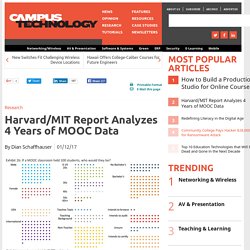
But that hardly tells the whole story. Harvard/MIT Report Analyzes 4 Years of MOOC Data. MOOC Completion and Retention in the Context of Student Intent. Key Takeaways MOOC critics are concerned about low overall completion rates, but these rates are typically evaluated without accounting for student intentions.
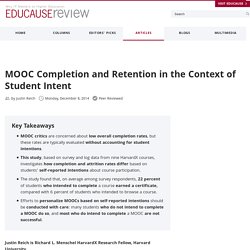
This study, based on survey and log data from nine HarvardX courses, investigates how completion and attrition rates differ based on students' self-reported intentions about course participation. The study found that, on average among survey respondents, 22 percent of students who intended to complete a course earned a certificate, compared with 6 percent of students who intended to browse a course. Harvard/MIT Report Analyzes 4 Years of MOOC Data. Research Harvard/MIT Report Analyzes 4 Years of MOOC Data By Dian Schaffhauser01/12/17 HarvardX/MITx course participant demographics If you were to describe the typical Harvard or MIT MOOC participant, he (yes, not she) would come from outside of the United States, be in his 20s, hold a bachelor-level degree and register for the course with the intention of getting certified.
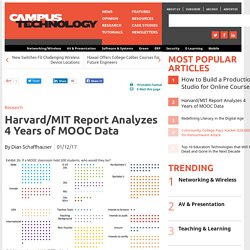
But that hardly tells the whole story. Higher Education in a Networked World: European Responses to U.S. MOOCs. Higher Education in a Networked World: European Responses to U.S.
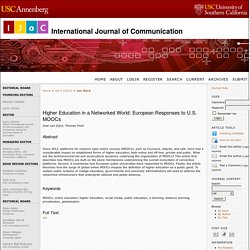
MOOCs Abstract Since 2012, platforms for massive open online courses (MOOCs), such as Coursera, Udacity, and edX, have had a considerable impact on established forms of higher education, both online and off-line, private and public. MOOCs as granular systems: design patterns to foster participant activity. Viewcontent. Excerpt from: Course iteration as a reflective process. MOOC iteration as a reflective process: HumanMOOC In 2012, xMOOCs rose from the laboratories of computer scientists who brought a machine learning approach to education.
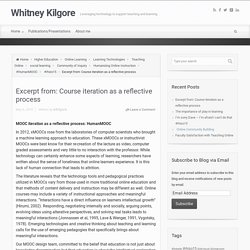
These xMOOCs or instructivist MOOCs were best know for their re-creation of the lecture as video, computer graded assessments and very little to no interaction with the professor. Mobile and Accessible Learning for MOOCs. Introduction Participation by a massive number of learners is one defining characteristic of MOOCs; the other is that courses should be open.
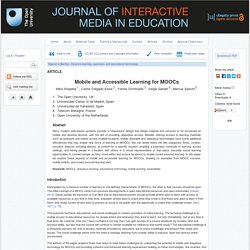
The initial concept of a MOOC came from previous developments in open educational resources and open universities (Daniel, 2012). Daniel quotes the injunction of Ivan Illich that an educational system should ‘provide all who want to learn with access to available resources at any time in their lives; empower all who want to share what they know to find those who want to learn it from them; and, finally furnish all who want to present an issue to the public with the opportunity to make their challenge known’ (Illich, 1971, p. 75). This presents technical, educational, and social challenges to modern providers of online learning. The technical challenge is to enable access to educational resources for people where and whenever they want to learn, not only immediately, but at any time in their lives. Pedagogies for massive open online vocational learning. A complete list of Massive Open Online Courses (free online courses) offered by the best universities and entities.
Study on MOOCs provides new insights on an evolving space. Today, a joint MIT and Harvard University research team published one of the largest investigations of massive open online courses (MOOCs) to date.
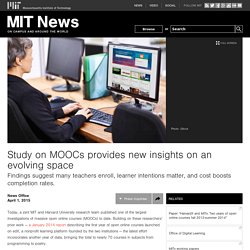
Building on these researchers’ prior work — a January 2014 report describing the first year of open online courses launched on edX, a nonprofit learning platform founded by the two institutions — the latest effort incorporates another year of data, bringing the total to nearly 70 courses in subjects from programming to poetry. “We explored 68 certificate-granting courses, 1.7 million participants, 10 million participant-hours, and 1.1 billion participant-logged events,” says Andrew Ho, a professor at the Harvard Graduate School of Education.
The research team also used surveys to gain additional information about participants’ backgrounds and their intentions. “What jumped out for me was the survey that revealed that in some cases as many as 39 percent of our learners are teachers,” Chuang says. Key findings 1. 2. 3. 4. Mmunications & Society: Ethics for MOOCs: Humble Transgressions. This post was extended by a Rhizo14 article and presentation, but that was fine as I learned some new stuff.
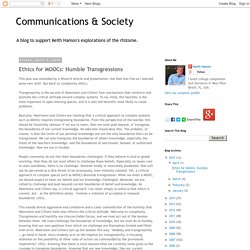
But back to complexity ethics. Transgressivity is the second of Woermann and Cilliers' four mechanisms that reinforce and promote the critical attitude toward complex systems. Top universities continue to invest in massive online courses. When massive open online courses, known as ‘MOOCs’, first emerged there was talk of a new revolution in online learning that would make education more affordable and accessible.
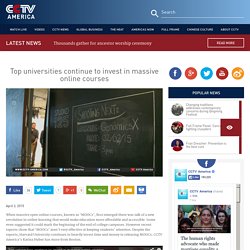
Some even suggested it could mark the beginning of the end of college campuses. However recent reports show that ‘MOOCs’ aren’t very effective at keeping students’ attention. Despite the reports, Harvard University continues to heavily invest time and money in releasing MOOCs. CCTV America’s Karina Huber has more from Boston. Highlights: Harvard U., Massachusetts Institute of Technology release updated MOOC research. If massive open online course offerings from Harvard University and the Massachusetts Institute of Technology could be described as a city, then computer science would be its vibrant downtown core, surrounded by less densely populated but no less characteristic neighborhoods of STEM, humanities and social sciences courses.
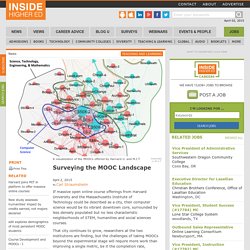
That city continues to grow, researchers at the two institutions are finding, but the challenges of taking MOOCs beyond the experimental stage will require more work than improving a single metric, be it the completion rate, proportion of female learners or bachelor's degree holders, they say. Harvard and M.I.T. on Wednesday released what researchers there called “one of the largest investigations of massive open online courses (MOOCs) to date” -- an analysis of 68 MOOCs, 1.7 million learners, 10 million hours of activity and 1.1 billion logged events.
The courses have faced an intense backlash in the years since The New York Times crowned 2012 the Year of the MOOC. v18n3. Web 2.0 Tools. Study on MOOCs provides new insights on an evolving space. Harvard U., Massachusetts Institute of Technology release updated MOOC research. Study on MOOCs provides new insights on an evolving space. Today, a joint MIT and Harvard University research team published one of the largest investigations of massive open online courses (MOOCs) to date. Building on these researchers’ prior work — a January 2014 report describing the first year of open online courses launched on edX, a nonprofit learning platform founded by the two institutions — the latest effort incorporates another year of data, bringing the total to nearly 70 courses in subjects from programming to poetry. “We explored 68 certificate-granting courses, 1.7 million participants, 10 million participant-hours, and 1.1 billion participant-logged events,” says Andrew Ho, a professor at the Harvard Graduate School of Education.
The research team also used surveys to gain additional information about participants’ backgrounds and their intentions. “What jumped out for me was the survey that revealed that in some cases as many as 39 percent of our learners are teachers,” Chuang says. Key findings 1. 2. 3. 4. MOOCs and Credentialing: A Revolutionary Perspective. By Gordon Rogers During the American Revolutionary War, the Continental Congress issued paper money known as Continental Currency.
The notes were backed by the “anticipation” of tax revenues. However, without solid backing and since they were easy to counterfeit, the notes quickly became devalued, giving rise to the phrase “not worth a Continental.” MOOCs and OERs for web talent: efficacy, acknowledgement and fit-for-purpose - A hybrid open panel at OER15. The European Commission has highlighted the potential of web and mobile startups to boost economic growth and well-being in Europe.
Yet this potential is threatened by a predicted shortage of over a million skilled workers. The MOOCS for web talent network was initiated by the EC's Startup Europe initiative to address this challenge. During 2014, the network has run webinars, conducted desk research and a survey of employers, employees and MOOC providers, connected a workshop at EC TEL 2014, and a stakeholder meeting adjacent to Slush in Helsinki. The aim of this hybrid open event is to share the findings of our work and open up the network to a wider community. Participate in the online discussion by clicking on one of the following emerging themes: At the OER15 conference, we will conduct a live panel which would draw on and summarise the online discussion.